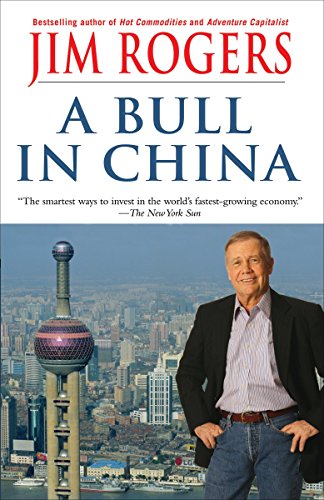Recently by Jim Rogers: Dow 1 Million? Sure, Why Not?
If you say the words u201Ccommoditiesu201D or u201CChinau201D in the midst of a group of investors, there’s a good chance Jim Rogers name is going to come up quickly. If you say both, that chance is almost a certainty.
Rogers made his name in the 1970s as one of the co-founders of the Quantum Fund — one of the most successful hedge funds in history — along with George Soros. He retired from the fund in 1980, but has kept himself busy, traveling around the world, twice on motorcycle and once in a custom-made Mercedes, and writing two books on the trips.
On the business side, he focuses primarily on investments in commodities and China, and has written books about both. His Rogers International Commodities Index is involved with several farmland investment funds, and he is an active investor in Chinese companies. He moved to Singapore in 2007, saying that “if you were smart in 1807 you moved to London, if you were smart in 1907 you moved to New York, if you were smart in 2007 you moved to Asia.”
While he says that China is the only emerging market where he isn’t selling right now, he is no longer buying new Chinese shares, and says he is now only investing in China indirectly through commodities investment. CIB spoke to Rogers about his opinion on the future of commodities, how a commodities boom would affect Chinese growth, and the effect the economic crisis is having on the future of the markets.
 Hot Commodities: How A...
Best Price: $1.25
Buy New $8.95
(as of 01:40 UTC - Details)
Hot Commodities: How A...
Best Price: $1.25
Buy New $8.95
(as of 01:40 UTC - Details)
What do you think the impact of commodities inflation will be on China’s overall growth story?
 A Bull in China: Inves...
Best Price: $3.50
Buy New $9.57
(as of 11:55 UTC - Details)
A Bull in China: Inves...
Best Price: $3.50
Buy New $9.57
(as of 11:55 UTC - Details)
Printing money is going to have an effect on commodity prices, there is no question about that. Throughout history whenever governments have printed money it’s led to rising commodities prices, and now the whole world is printing money. Food inventories are the lowest they’ve been in a decade, farmers can’t get loans, you can’t get a loan to open up a new mine — it’s not hard to see that prices are going to rise. China has one advantage in that it has many of its own commodities, but prices are going to go higher, [and that will affect growth]. Is that the end of the China growth story though? I doubt it.
You’ve spoken out rather strongly against the American stimulus package, how do you feel about the Chinese stimulus package?
China is different from the US. China saved up money for a rainy day; now it is rainy and they are spending their reserves. The US — well the US had no money saved — but China is also spending the money in a smarter way, developing infrastructure and expanding capacity to use down the road. The US is focusing on make-work programs and things that will appeal to voters but do nothing for the economy. I’m not in favor of any stimulus programs, but as they’re a fact of life, I think the Chinese have done a better job.
I know you often say you’re a bad market timer, but are you expecting commodity prices to return to 2007—2008 levels quickly, or are you expecting growth to be more staggered?
These things rarely happen all at once, things go up and down, and bubbles usually occur and last one to three years. But commodity prices are rising now, and they will continue rising.





